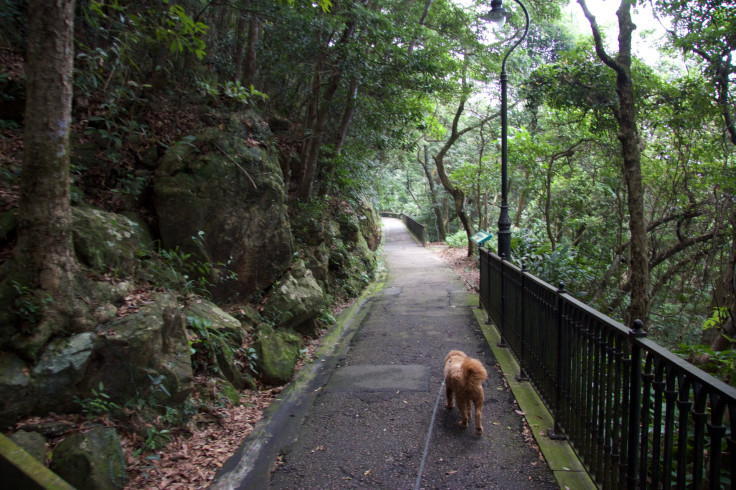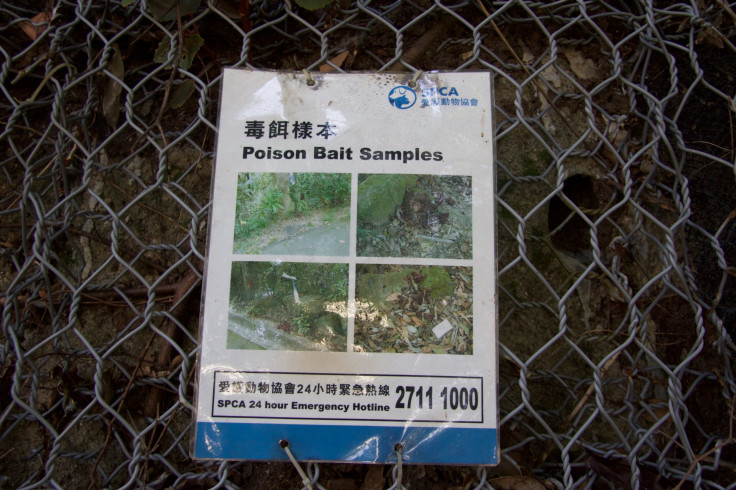Hong Kong Dog Poisonings: Police, Animal Rights Groups Baffled By Decades-Long Campaign Of Animal Killings

HONG KONG -- Bowen Road is a concrete ribbon that cuts through the hillside jungle above the glittering skyscrapers of the city's central business district. A twisting, tree-lined pedestrian path, dotted with exercise equipment and offering spectacular views, it is an urban haven for joggers and dog walkers. The family walking their dogs along the path likely did not notice their animals eating poisoned meat, but the symptoms would have manifested quickly.
The dogs began to experience diarrhea, violent convulsions and vomiting. They were rushed to a local vet, where one died. The incident, which took place in the city late last month, is the latest in a decades-long poisoning campaign that has sent hundreds of animals to a gruesome death, and baffled police and animal support groups.
It is unclear whether the poisonings are the work of one person or multiple individuals, but the methods that have been used since the killings began in 1989, are remarkably similar. Small amounts of meat, generally chicken or pork, are left lying in the path in specific areas to lure unsuspecting animals. The meat is treated with an organophosphate poison -- normally pesticide or a household poison that can be easily obtained -- and before the owners know it, their dogs' lives are hanging in the balance.
At least 200 animals have been killed since the poisoning campaign began, though the actual number of deaths is likely much higher. Data from the Hong Kong Society for the Prevention of Cruelty to Animals (SPCA) shows that there have been 62 poisoning incidents involving over 90 animals between Dec. 2012 and Sept. 2015. The poisonings have been happening for the last quarter of a century, and occur with less frequency than they used to.

While not all the animals poisoned die, even those that do survive the ordeal suffer terribly.
“I've had the displeasure of seeing many of these cases over the years,” Dr. Lloyd Kenda, of the Valley Veterinary Center, whose practice treated the dogs poisoned last month, told International Business Times in an interview. Kenda said that he has personally seen at least 100 such cases in his practice over the last 20 years. “Its a terrible way to die. It's really quite a dramatic death. Dogs are convulsing and running fevers. There's diarrhea and vomit,” he added.
What has motivated such a lengthy campaign of animal cruelty is a subject of much debate in the city. Some commentators have suggested that the poisoner has an obsessive dislike of dogs that foul footpaths and may have begun the campaign as revenge, the South China Morning Post reported. An SPCA spokeswoman told IBTimes that one person, an elderly man, convicted over a poisoning incident said that his wife had been frightened by dogs.
Others have argued that there is an economic or social aspect to the killings: the poisoners have largely targeted two areas, Bowen Road and Black's Link, both highly affluent districts, home not only to the wealthy, but to a large number of the city's expatriate population. A certain degree of tension exists between the city's local Chinese and foreign populations, with some of the former regarding the latter as a hangover from the territory's former status as a British colony.
If the poisoners are looking to target the rich and powerful, they've certainly succeeded. In 1997, a terrier called Whiskey, who belonged to Chris Patten, the last British governor of Hong Kong, was poisoned on Bowen Road while out walking. While the dog survived, as many that are able to be treated quickly are, the incident prompted a significant police operation that ultimately proved fruitless.

Despite the poisoning campaign lasting over two decades, Hong Kong police have only managed to convict one person in connection with a single incident. The lack of convictions, however, is not the result of a lack of effort on the part of the city's police, but rather the inherent difficulty of catching people in the act of poisoning, along with legislative shortcomings, according to experts IBT spoke with.
“We don't have a huge history of success with prosecutions,” Dannielle Baber, Deputy Chief Officer of the Inspectorate at the Hong Kong SPCA said. “By its very nature, this is the kind of thing that people do covertly ... unless you have a suspect in the frame, you're very unlikely to see that through to a successful prosecution, which is a huge frustration,” she told IBT.
Police have launched multiple undercover and surveillance operations over the poisonings through the years, but have met with little success in apprehending suspects.
Hong Kong animal cruelty legislation ensures that even if police found someone throwing poisoned meat in the target area, they would have to prove in court that the suspect intended to cause animals “unnecessary suffering”. Police would almost certainly be unable to link a suspect to the long history of cases throughout the years, Kenda said.
The Hong Kong SPCA has in the past offered a HK$200,000 (U.S.$25,800) reward for information leading to the arrest of the suspect or suspects involved in the poisonings.
While poisoning incidents are less common than they used to be, anytime locals have dared to hope that the campaign is finally at an end, a poisoner strikes again.
Confusion over the motivations for murder linger; some in the city fear that the person or persons responsible are motivated by sick thrills, and are unlikely to stop. “I think some people get a kick out of it and that’s why they do it,” former Hong Kong SPCA chairman John Wedderburn told Time Out Hong Kong “They don’t do it for population control or to clean up the streets. They do it for fun.”
© Copyright IBTimes 2025. All rights reserved.





















